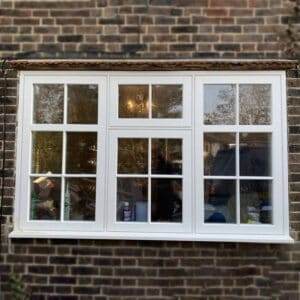November has brought with it low temperatures and frosty mornings, leaving many Brits with foggy windows as they wake up – however, there could be another reason for that steamy double glazing around your home.
Steamed-up windows can create a somewhat chilling effect when you touch them thinking they’re damp to the touch. However, letting steamed up windows thrive in your home could result in a lowered air quality.
It’s cold outside, but you might be feeling humid inside. This is probably because of factors like poor ventilation or leaks that could be spreading water droplets over your furniture. Take some time to read through the following tips and find out how to keep condensation at bay.
Why do my windows steam up on the inside?
When a cold surface is in contact with moisture in humidity, water vapour escapes. This causes the liquid to turn back into a liquid.
This misty, wet condensation on your windows is also called condensation.
Sometimes, windows get steamed up from the inside. It’s easy to remedy this with a quick wipe of the window to catch any drips that have accumulated on the outside. If you tend to do this daily, there’s no need, but if you notice a build-up of moisture on your window ledge, it’s a good idea to clean it off regularly.
How to prevent condensation on windows
Preventing condensation is as easy as controlling moisture levels in the air. In turn, it’s fast and simple to find a happy medium by turning on your ventilator on a low setting.
It’s important to control humidity and moisture in the atmosphere to keep a home or office environment comfortable. Ventilating your windows is a good way to do this.
Most modern double glazed windows have a trickle vent feature to make your life easier. It deals with condensation and makes sure you don’t need to worry about it.
It’s important to balance the temperature in the room when it’s too hot, so open up your windows regularly when it’s sunny outside. When you’re not there, use the air-purifying feature that sends in some fresh air while keeping your windows closed.
Move your houseplants
Plants are wonderful beauty additions to our busiest environments – they can give you peace of mind and enrich your life. Just remember that some plants like soil that is moist, shady, and on the cooler side.
Clusters of houseplants can both add to humidity and reflect watery condensation on windows.
Houseplants might be practical for the winter, but save those crafty display options for the warmer months.

Use a dehumidifier
Think about your health and the health of your family this winter. Not only will a humidifier help you breathe more easily, it’ll also keep the air from being so dry with bills from doctors and hospitals to be paid!
Damp eliminators will not only dry the air but also eliminate any allergens and dust mites lurking around your house
Always take care when using a dehumidifier in the winter. Low temperatures may mean that the coils freeze, so never leave a dehumidifier unattended for an extended period of time.
Keep your home well heated while using a dehumidifier to reduce condensation, balance humidity levels room-to-room.
Use extractor fans
Cooking hearty hot dinners and taking long hot baths can be just some of winter’s most delightful moments – but they could be making condensation worse.
Use extractor fans to ventilate your kitchen and bathroom when cooking or using the loo. The steam from these two areas, especially the toilet, can cause a lot of condensation – this can be dealt with simply by proactively using extractor fans to suck up moisture.
It’s vital to leave your kitchen exteriors for a period of time after you’ve cooked or showered. This will keep the moisture at a steady level and stop mould growth, especially if there’s no heating system.
To prevent steamy mirrors, you can reduce residual water building up by applying any of the following beforehand:
- Shaving cream
- White vinegar and water spray
- Dish soap
Don’t dry clothes indoors
Cleaning clothes on a line during winter may seem cheaper than using a tumble dryer, but it can make your home very humid.













